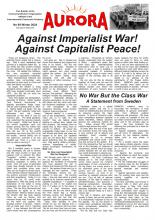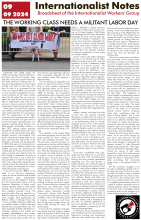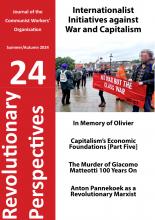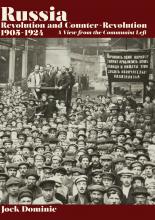November 2024
Value-form
Can you explain value-form to me? And can you really dumb down the terms for me and not assume I am familiar with marxism.
We will discover in the progress of our inquiry, that the economic character masks ["Charaktermasken" in the German original] of persons are only the personifications of economic relationships, where persons face each other as their bearers. Namely, what distinguishes the commodity owner from the commodity is the circumstance that every other commodity counts for the commodity only as the appearance-form of its own value. A born leveller and a cynic, the commodity is constantly ready to exchange not only soul, but body, with each and every other commodity... The owner makes up for this lack in the commodity of a sense of the concrete, physical body of the other commodity, by his own five and more senses (...) commodities must be realized as values before they can be realized as use-values. On the other hand, they must stand the test as use-values before they can be realized as values.(...) In their difficulties, our commodity-owners think like Faust: 'In the beginning was the deed'. Thus they act already before they have thought it out.
Capital Vol. 1, Penguin ed., p. 179-180, translation corrected according to the German edition and emphases added
?
Start here...
- Navigating the Basics
- Platform
- For Communism
- Introduction to Our History
- CWO Social Media
- IWG Social Media
- Klasbatalo Social Media
- Italian Communist Left
- Russian Communist Left
The Internationalist Communist Tendency consists of (unsurprisingly!) not-for-profit organisations. We have no so-called “professional revolutionaries”, nor paid officials. Our sole funding comes from the subscriptions and donations of members and supporters. Anyone wishing to donate can now do so safely using the Paypal buttons below.
ICT publications are not copyrighted and we only ask that those who reproduce them acknowledge the original source (author and website leftcom.org). Purchasing any of the publications listed (see catalogue) can be done in two ways:
- By emailing us at uk@leftcom.org, us@leftcom.org or ca@leftcom.org and asking for our banking details
- By donating the cost of the publications required via Paypal using the “Donate” buttons
- By cheque made out to "Prometheus Publications" and sending it to the following address: CWO, BM CWO, London, WC1N 3XX
The CWO also offers subscriptions to Revolutionary Perspectives (3 issues) and Aurora (at least 4 issues):
- UK £15 (€18)
- Europe £20 (€24)
- World £25 (€30, $30)
Take out a supporter’s sub by adding £10 (€12) to each sum. This will give you priority mailings of Aurora and other free pamphlets as they are produced.
ICT sections
Adverts
Glasgow Bookfair
RED AND BLACK CLYDESIDE BOOKFAIR
The CWO will have a stall at the Red and Black Clydeside Bookfair, there will also be an NBWCW meeting.
When: Saturday, 7 December 2024
Where: Quaker Meeting House, 38 Elmbank Cres, Glasgow G2 4PS
Belfast Bookfair
BELFAST RADICAL BOOKFAIR
The CWO will have a stall at the Belfast Radical Bookfair.
When: Saturday, 30 November 2024
Where: Peter Froggatt Centre (3rd Floor), 7-9 College Park E, Belfast BT7 1PS
IWG Meetings
IWG MEETINGS
The IWG will be holding regular in-person meetings where sympathizers are encouraged to come and get in contact.
New York: Last Saturdays of the month 3:30pm at Peculier Pub (145 Beecker St)
Philadelphia: Last Saturdays of the month 11am at B2 cafe (1500 E Passyunk Ave)
Columbus: Last Sunday of every month, from 8PM-10PM, at Kafe Kerouac (2250 N High St, Columbus, OH).
Los Angeles: Please contact to get in touch.
Means of contact:
Email: us@leftcom.org
Instagram: @iwg.official
Facebook: @iwgusa
Twitter: @IWGOfficial
Recent publications
Aurora is the broadsheet of the ICT for the interventions amongst the working class. It is published and distributed in several countries and languages. So far it has been distributed in UK, France, Italy, Canada, USA, Colombia.
November 2024
- Editorial
- Indigenous Radicalism Pursues Reconciliation with Capital
- Sahel : Locus of Imperialism in Africa?
- Return of Inflation: A Review
- Populism, Trumpism, and Democracy - How About Communism?
- Capitalism's Environmental Destruction & Imperialism
1919 is the journal of the two North American affiliates of the ICT, Klasbatalo and Internationalist Workers' Group.
September 2024
Mutiny is the bulletin of Klasbatalo. Mutinerie est le bulletin de Klasbatalo.
Out now!
Journal of the Communist Workers’ Organisation -- Why not subscribe to get the articles whilst they are still current and help the struggle for a society free from exploitation, war and misery? Joint subscriptions to Revolutionary Perspectives (3 issues) and Aurora (our agitational bulletin - 4 issues) are £15 in the UK, €24 in Europe and $30 in the rest of the World.
Written by Jock Dominie. £12, 276pp.
The Russian Revolution remains a landmark event in history. For the bourgeois historians, the October Revolution is thought to be a tragedy that set back the achievements of the “democratic” February Revolution, and allowed the Bolsheviks to wreak havoc on their citizens and the world. For the Stalinists, the events of 1917 paved the way for the birth of the USSR, which they point to as a prototypical example of “socialism in one country”. In reality, the February and October Revolutions were both part of the same proletarian revolution.
The book can be ordered by emailing us at uk@leftcom.org and asking for our banking details, or by donating the cost of the publications required via Paypal using the “Donate” button. Postage charges should be added. If in the UK, and paying direct to our bank account, first class postage is free. If via Paypal add £2. For Europe cost of a copy with postage is €20 (EUR), for Australia it is $42 (AUD) and for the USA and anywhere else in the world it is $27 (USD).
User login

This work is licensed under a Creative Commons Attribution 3.0 Unported License.









Sandman
Sandman
This is a difficult ask since you have to be acquainted with some basic concepts of Marxist economics to be able to make progress on this ("There is no royal road to science" [Marx]). The answer is to be found in the early chapters of capital Vol 1. Below is an extract from one of the first texts the CWO ever wrote (it is now out of print but we are thinking of reviving it). The issue raised in your quote is about the two-fold character of commodities - as use values and as exchange values. the passage below tried to deal with that.
"The Labour Theory of Value
In a society where people produce their own means of subsistence then the products of their labour are utilities or use values, which may be in the form of objects for consumption or objects which are to function as part of the means of production.
In a primitive communist society where there is no division of labour and producers satisfy their own needs, production is in the form of values alone. As soon as the level of production develops beyond a subsistence economy and people begin to exchange some of their products (barter) then a commodity character is also given to these goods. Commodities have the dual character of being objects of utility (or use values) and objects which can be exchanged for other commodities (exchange values).
All commodities are produced by human labour power and any single commodity can be seen as the crystallization of the human labour power required to produce it. The value of a commodity is the amount of human labour power in the abstract which is incorporated in that commodity. The only way the amount of labour embodied in a commodity can be measured is by measuring the length of labour time necessary to produce it. Thus labour time is the measure of value. However, although labour is the source of all value, the value of a particular commodity is not determined by the length of time it takes any individual worker to produce it. (If this were so then value would vary in accordance with, say, how fast or slow any individual worker was.) The value of a commodity is determined by the average amount of social labour time necessary to produce it at any particular level of development of the productive forces, and it is this fact which enables commodities of differing physical qualities to be compared with one another for the purpose of exchange. (Thus, for example, if it takes 5 hours on average for a weaver to produce 15 yards of cloth and 5 hours on average for a carpenter to make a table, then 15 yards of cloth are equal in value to one table. If we further assume that the price of any commodity is equal to its value, then the price of a table will be the same as the price of 15 yards of cloth.) It is only through the process of exchange that the value of commodities can be manifested since the value of one commodity can only be expressed in terms of another commodity.
The Capitalist Mode of Production and the Law of Value
Although commodity production and the concomitant division of labour which this implies were necessary pre-conditions for the development of capitalism, there are certain other historical conditions which had to exist before capitalism could come into existence, that is, before the so-called primitive accumulation of capital could take place.
First of all exchange via barter had to give way to a money economy. Money, as the universal commodity in which the exchange value of all commodities can be expressed, appears first as a convenient standardized measure of exchange value, and later as a medium of exchange, facilitating the expansion of trade.
The general character of money which allows it to represent the exchange value of all other commodities means that money is the "material representative of general wealth". (Grundrisse) As such, money historically became an end in itself, as commodity production and trade expanded. The Mercantilist system was based on the possibility of accumulating wealth in the general form of money through trade.
Another fundamental pre-condition for the rise of the capitalist mode of production is the existence of 'free' labourers who do not themselves own any means of production and are therefore forced to sell their labour power (work for a wage) in order to live
"...The labourer instead of being in the position to sell commodities in which his labour is incorporated, must be obliged to offer for sale as a commodity that very labour-power, which exists only in his living self." (1)
The existence of wage labour means that labour power is now turned into a commodity whose exchange value is the average socially necessary labour time which it takes the labourer to produce his own material needs. Expressed in money terms, the exchange value of labour equals the wages of the worker. Once labour power is turned into a commodity the production of surplus value, that is, value over and above that which is necessary for the workers to maintain and reproduce themselves, is made possible. According to the law of value, commodities are exchanged in accordance with their value, or the amount of labour time which they embody. Under capitalism the operation of the law of value means that profits are made by capitalists selling commodities produced by the workers at their value, whilst at the same time the workers are paid the equivalent of the exchange value of their labour power. This is so, because once the labourer is obliged to sell his labour power in order to live he is also forced to work for a longer period of time than it takes him to produce the amount of value equivalent to his material needs. It is this surplus value, created by the labour power of the workers and appropriated by the owners of the means of production, which is the source of capital's profit."
Briefly, value is human
Briefly, value is human labour congealed in a commodity.